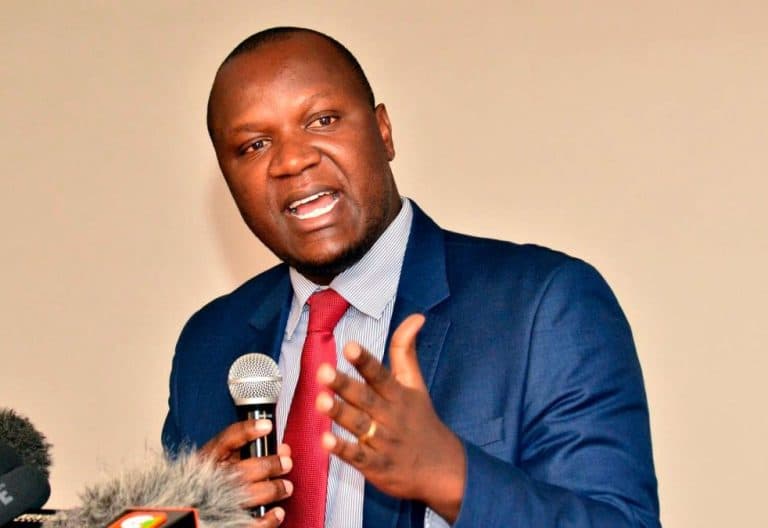We're loading the full news article for you. This includes the article content, images, author information, and related articles.
Prominent Kenyan lawyer Willis Otieno has strongly criticised the government's insistence on Kenyans repaying certain state loans, terming it an "economic genocide." He argues that such debts, incurred without public consent

Nairobi, Kenya – Lawyer Willis Otieno has ignited a national debate by asserting that compelling Kenyans to service state loans acquired without their full knowledge and consent constitutes "economic genocide." Speaking on his X account on Wednesday, October 1, 2025, Otieno emphasised that every shilling allocated to these particular loans is diverted from vital public services.
Otieno's strong remarks come amidst growing public concern over Kenya's escalating public debt. He stated, "Forcing Kenyans to repay odious debt, loans borrowed without their consent, without transparency, and without any real benefit to the people, is nothing less than economic genocide." This sentiment resonates with a recent TIFA survey report indicating that the Finance Bill 2025 is widely perceived as exacerbating the cost of living and eroding personal finances for most Kenyans. The burden of repaying these loans, Otieno added, has left many Kenyans struggling to survive in challenging economic times.
Kenya's public debt has been a persistent issue, with the total public and publicly guaranteed debt stock reaching Ksh 10.6 trillion—65.7 percent of GDP—as of June 2024, a significant increase from Ksh 1.5 trillion—43.1 percent of GDP—in June 2011. The 2025 Budget Policy Statement indicates that Kenya's public debt, while sustainable as a medium performer, carries an elevated risk of debt distress, with the present value of debt at 63% of GDP, exceeding the benchmark of 55%.
Kenya has established a legal framework to enhance transparency and accountability in public debt management, including the Constitution of Kenya 2010 and the Public Finance Management Act (PFM Act) 2012. These mandates require the publication of key debt reports such as the Medium-Term Debt Management Strategy (MTDS), Annual Debt Management Reports, and Monthly Debt Bulletins. The Public Debt Management Office (PDMO) is tasked with developing and implementing the MTDS, monitoring debt levels, and ensuring sustainability.
Despite these provisions, challenges in achieving full transparency persist. A High Court ruling in December 2024 ordered the National Treasury to disclose critical information on Kenya's bilateral loans and sovereign bonds, citing violations of constitutional principles regarding public access to information, public finance, and good governance.
Otieno, a prominent practicing lawyer specialising in governance, public law, and constitutional matters, has been vocal on issues of public accountability. His assertion that "Every shilling diverted to service these illegitimate debts is stolen from classrooms, hospitals, and the small businesses that keep families alive. Odious debt does not build a nation; it buries it," highlights the severe social and economic consequences. He further claimed that Kenya holds Ksh 2.3 trillion in "questionable debt," which he argues was not intended for national development.
Analysts suggest that Otieno's statements could significantly influence public discourse and policy implementation, prompting calls for greater clarity on timelines, costs, and safeguards related to public borrowing. The government's narrative often emphasizes the necessity of repaying debt, while critics argue that high taxation, particularly through measures like the Finance Bill 2024, can worsen inequality and undermine social welfare.
The continuous rise in public debt poses significant risks, including reduced fiscal space for essential services and development initiatives. Poor debt management can lead to a fiscal crisis, with a substantial portion of ordinary tax revenue dedicated to debt servicing, leaving limited funds for critical sectors like education and healthcare. Refinancing loans at higher interest rates, as seen with the Eurobond, further exacerbates the repayment burden.
The specific details of the "odious loans" Otieno refers to, including their origin, terms, and the individuals or entities involved in their procurement, remain largely undisclosed to the public. While the National Treasury publishes debt reports, concerns about the quality and comprehensiveness of this information persist.
The ongoing public debate and legal challenges surrounding debt transparency are expected to intensify. Stakeholders will be closely watching for government responses to calls for greater accountability and potential policy shifts in public borrowing and debt management. The implementation of the High Court's directive for the National Treasury to disclose loan information will be a key indicator of progress towards greater transparency.
Keep the conversation in one place—threads here stay linked to the story and in the forums.
Sign in to start a discussion
Start a conversation about this story and keep it linked here.
Other hot threads
E-sports and Gaming Community in Kenya
Active 9 months ago
The Role of Technology in Modern Agriculture (AgriTech)
Active 9 months ago
Popular Recreational Activities Across Counties
Active 9 months ago
Investing in Youth Sports Development Programs
Active 9 months ago